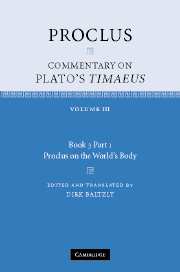V - The Fifth Gift of the Demiurge: Self-Sufficiency
Published online by Cambridge University Press: 30 June 2022
Summary
There was no air around it that it might be required to breathe; nor did it need to have any sort of organ by which it could take nourishment into itself or again any organ with which to expel what it had previously digested. For since there was nothing else, there would be nothing to come to it or leave it from anywhere. Nourishment was present to it from its own waste, and it came about from its design that all things that it experienced or did were experienced in it and done by it. For its builder thought it better for it to be self-sufficient rather than in need of something else besides itself. (33c3–d3)
Theoria
Through these words he takes away two other kinds of sensation from the universe: smell and taste. It doesn't have the former because the universe would not have respiration, for that which breathes requires a sense of smell. (This is so in this case, even though it is not true that everything that has a sense of smell is such as to breathe. Nonetheless the animals with a sense of smell that do breathe are more perfect than those who do not (cf. II. 87.13)). Therefore this sense is taken away from the universe. As for the latter case, he takes the sense of taste away because the universe does not need to eat; for [only] animals which are nourished are in need of a sense of taste.
Well, then we may again ask, ‘How can this be?’ Isn't it like this: the particular senses do not pertain to the universe, but there is a single, simple sense which is cognizant (gnôristikos) of all the things in it: the colours, sounds, tastes, odours, qualities, being themselves the essences of sensible things as they are in an underlying subject. For if the single sense in us makes use of all the particular senses and knows all [the particular sensibles] by virtue of the same thing (kata tauton), how much more then must the cosmos know at one time all the various sensibles by virtue of one logos and a single sense! Therefore, because it is one thing by virtue of its essence and in just the same way it has been allotted a shape that is uniform, so too it has a single sense that encompasses all the sense objects.
- Type
- Chapter
- Information
- Proclus: Commentary on Plato's Timaeus , pp. 146 - 153Publisher: Cambridge University PressPrint publication year: 2007

